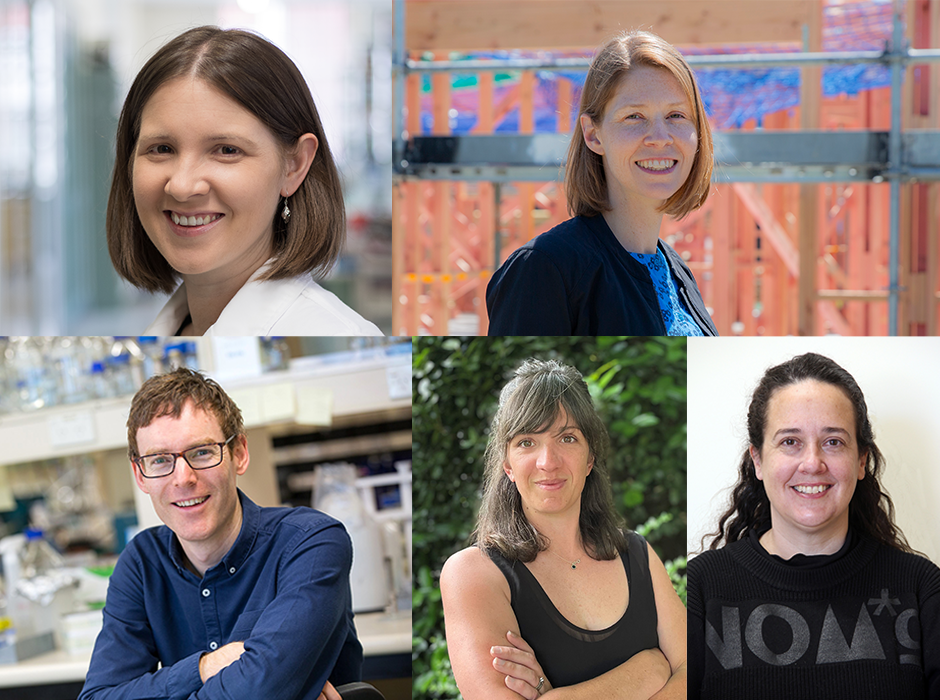
Clockwise from top left: Dr Rosie Brown, Dr Kimberley O'Sullivan, Professor Siân Halcrow, Dr Megan Leask and Professor Peter Fineran.
The impact of housing on mental health and how hormones regulate parents’ behaviour after their offspring are born are just two of the studies by University of Otago researchers that have today received prestigious Fellowships.
Announced last Friday, Drs Kimberley O'Sullivan, Rosie Brown, and Megan Leask have received Royal Society Te Apārangi Rutherford Discovery Fellowships.
The Fellowships support some of Aotearoa New Zealand’s most promising early-to mid-career researchers as they secure and accelerate their research careers and contribute to the country’s research, science and innovation system. Recipients will receive $800,000 each over the next five years to conduct their research projects.
Chair of the selection panel, Associate Professor Marama Muru-Lanning, of the University of Auckland, invoked a whakataukī in her feelings toward the recipients:
“Whiria te tangata, ka puta te oranga, Whiria te mātauranga ka puta he tino rangatiratanga. By weaving people, promote well-being, By weaving knowledge, promote excellence.
“The wero challenge above encapsulates the unique honour we have in selecting this year’s Rutherford Discovery Fellows.”
Associate Professor Muru-Lanning says it was a privilege to interview the shortlisted scholars.
“This year the calibre was outstanding. Our successful fellows are driven, passionate people of the highest class. I am absolutely confident that this cohort will thrive and give service to Aotearoa-New Zealand and humanity.”
Dr Brown, of the Department of Physiology and Centre for Neuroendocrinology, will focus on how hormones regulate the mood and behaviour of parents after the birth of their offspring.
Working with her team of biomedical researchers, she aims to understand how hormones act in the brain to bring about healthy changes in the behaviour of parents. The project focuses on understanding the role of the hormone progesterone in altering mood and behaviour in mothers during pregnancy and through into the postpartum period.
Dr O’Sullivan, of the Department of Public Health, hopes to understand the mental health impacts of housing and energy use.
Together with community and industry partners, she and her team aim to systematically explore the links between energy poverty, cold homes, and mental health outcomes in the hopes of understanding this burden on peoples’ wellbeing and assess which interventions work best.
Dr Leask, of the Department of Physiology, will use the funding to utilise the latest and most comprehensive genetic datasets we have from Māori and Pacific people to identify key biological mechanisms underpinning metabolic health and disease.
It will also allow her to develop a translational pipeline using cell assays and zebrafish to understand what the molecular mechanisms are that underpin these genetic findings.
Also announced today are the James Cook Research Fellowships, which were awarded to Professors Siân Halcrow and Peter Fineran.
These two-year Fellowships are given to researchers at the height of their careers who have achieved national and international recognition in their area. The funding package annually is $100,000 plus GST and up to $10,000 plus GST in relevant expenses.
Professor Halcrow, of the Department of Anatomy, will study anatomical skeletal legacy collections in Aotearoa and the US.
She will work with colleagues from Te Papa Tongarewa, Drs Jamie Metzger and Amber Aranui, and US researchers to undertake the first comprehensive survey of such collections, held by museums and teaching institutions, in both countries and conduct a systematic assessment of stakeholder perspectives on their use and curation.
Professor Fineran, of the School of Biomedical Sciences, will develop a novel method for generating random mutations in phage genomes to determine the genes which are important for phage function and allow them to evade bacterial defence systems.
This fundamental research will facilitate the rapid generation of phages that can evade specific bacterial defence systems - an important step towards using phages for the treatment of antibiotic-resistant bacterial infections.
Deputy Vice-Chancellor (Research and Enterprise) Professor Richard Blaikie says it is fantastic to see Otago researchers celebrated at different stages of their careers.
“Whether they are at the start of their career or already leaders in their field, these researchers will make significant impact in Aotearoa and all over the world from their work,” Professor Blaikie says.
“The range of research areas recognised also showcases the depth and diversity of our academic community.”